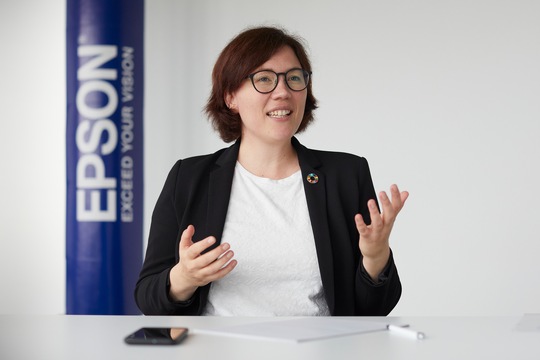Further 100 billion yen (790 million euros) investment in sustainable technologies to benefit climate and customers
Concerns about climate change are growing among businesses and individuals. So it's no surprise that Epson's investment in sustainable technology, and in business inkjet technology in particular, is paying off as demand for environmentally friendly printing systems continues to grow.
Epson has long used environmentally friendly methods in its business processes. For example, since 2018, the company has invested over half a billion euros in the development of its PrecisionCore inkjet technology, which works without generating heat, making it a sustainable alternative to competing printing technologies. Recent investments of an additional 100 billion yen (€790 million) are expected to enable the production of new materials and technologies that will further improve the sustainability profile of Epson's IT technologies.
Industry trends and expectations
A new IDC Info Snapshot report, produced in collaboration with Epson, examines the trends and expectations of enterprise customers in the printing market and forecasts that demand for laser printing systems will shrink by 2.6%, while ink is predicted to grow at an annual rate of around 7%1.
The report further identifies the main reasons for this development: research by IDC found that 88% of IT managers surveyed in the study consider the points of energy consumption and waste production (87%) to be "extremely" or "very" important when selecting new printing systems1. The IDC study also shows that 78% of respondents consider inkjet printers and multifunction devices to be more environmentally friendly than laser printers and multifunction devices1.
"Today, printing infrastructure accounts for around 10% of electricity consumption in an office. By switching to Epson business inkjet printers, companies save up to 83% of this expenditure," explains Leonie Sterk, Sustainability Manager at Epson Deutschland GmbH. "Climate change concerns us all, so we all have to do something about it. Epson faces up to this responsibility and has therefore invested large sums to improve the sustainability of both our business processes and our products. In doing so, we are also helping our customers and partners to improve their environmental footprint."
The fundamentally good attitude towards inkjet printing is also highlighted in a new IDC Vendor Spotlight report. It reveals that around 65% of European IT executives plan to spend up to half of their budgets exclusively on sustainable products and services. The report also shows that trust and positive attitudes towards business inkjet printers are mainly based on their good sustainability profile, security in their use and compliance capabilities1.
"Laser printers are resource intensive and have a complicated printing system consisting of many parts," Sterk continued. "Inkjet printers are also demonstrably better in this respect, but even inkjet printers are not all the same. Epson printing systems use heat-free technology, which means they don't need heat. That's why they need much less power when they are switched on or woken from sleep mode. There's also no warm-up time, so they've already printed the first page while other printers are still in the process of booting up. This means faster printing with consistently high quality, significant time savings, lower costs and, of course, less power consumption."
Ink with benefits also in hybrid working models
Workforces operating in hybrid models also prefer inkjet printing and are looking for sustainable, cost-effective solutions for the home office and smaller office workgroups. In 2021, Epson celebrated the sale of its 60 millionth EcoTank printer2. Epson EcoTanks also reduce power consumption as well as waste generated by consumables. The IDC Spotlight report found that these printers, which use refillable ink tanks, produce significantly less waste, for example from packaging materials. This is another reason why there is strong demand for these printers in offices across Europe. The report also showed that about 13% of employees working in home offices already purchase their consumables through subscription models. IDC predicts that by 2024, around 60% of businesses will move to such a subscription model for print-related services1.
"We will continue to communicate the benefits of our proprietary heat-free inkjet technology and the various purchase and subscription models to provide sustainable printing solutions to businesses and home office workers," Sterk concludes.


 Deutsch (Germany)
Deutsch (Germany)  Polski (PL)
Polski (PL) 







